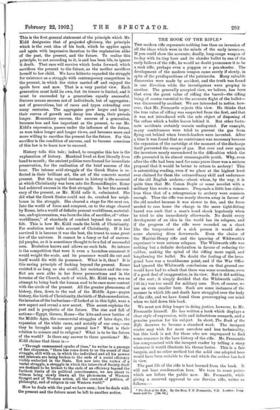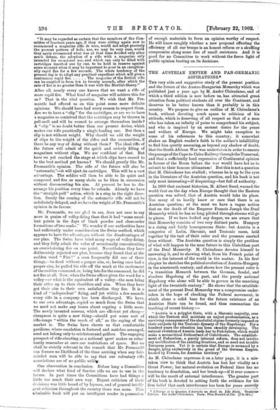THE BOOK OF THE RIFLE.*
Tux modern rifle represents nothing less than an inversion of all the ideas which were in the minds of the early inventors If you could show the accurate, deadly, long-range weapon of to-day with its tiny bore and its slender bullet to one of the early fathers of the rifle, he would no doubt pronounce it to be a rook rifle, perhaps even a popgun or a pea-shooter. The development of the modern weapon came surely if slowly, in spite of the predispositions of the patriarchs. Many valuable discoveries were made by accident, and the truth was. found in one direction while the investigators were groping in. another. The generally accepted view, we believe, has been that even the great value of rifling the barrel—the rifling. being of course essential to the accurate flight of the bullet— was discovered by accident. We are interested to notice, how- ever, that Mr. Fremantle rejects this view. He thinks that the true value of rifling was suspected from the first, and that it was not introduced with the sole object of disposing of the refuse which a bullet leaves behind it. But other fortu- nate accidents certainly remain undisputed. For example, many contrivances were tried to prevent the gas from flying out behind when breech-loaders were invented. After a time it was found that no contrivance was necessary because the expansion of the cartridge at the moment of the discharge itself prevented the escape of gas. But over and over again the inventors nearly surrendered to the difficulties which the rifle presented in its almost unmanageable youth. Why, even after the rifle had been used for some years there was a serious. proposal that it would be better to return to archery! Thia is astonishing reading, even if we place at the highest level. ever claimed for them the extraordinary skill and endurance of the old English archers,—about whom, by the way, it is quite time that Mr. Conan Doyle or some novelist with a military bias wrote a romance. Proposals a little less ridicu- lous than that of a retrogression to archery were common enough. Thus the rifle was nearly thrown away in favour of the old musket because it was slower to fire, and the force needed to ram home the charge in the more tight-fitting barrel was such that a man's hand shook hopelessly when he tried to aim immediately afterwards. No doubt every development of an idea in the world has its relapses, and. ifthe progress of the rifle were recorded on a chart like the temperature of a sick person it would show some alarming dives downwards. Even the choice of the Martini-Henry rifle and the ignoring of Whitworth'a experimer ts were serious relapses. The Whitworth rifle was. nothing but a definite declaration in favour of reducing the calibre, making the spiral of the rifling more rapid, and lengthening the bullet. No doubt the fouling of the hexa- gonal bore was a troublesome point, and if the War Office had ignored the Whitworth conclusions on that ground one would have had to admit that there was some soundness, even if a good deal of exaggeration, in its view. But it did nothing. of the sort ; it simply decided that the Whitworth calibre (.45 in.) was too small for military uses. Now, of course, we use an even smaller bore. Such are some instances of the manner in which life and death have struggled over the body of the rifle, and we have found them preoccupying our mind when we laid down this book.
We must not delay longer in doing justice, however, to Mr. Fremantle himself. He has written a book which displays a clear style of expression, wide and industrious research, and a genuine passion for his subject. In short, The Book of the Rifle deserves to become a standard work. The inexpert reader may wish for more anecdote and less technicality, but this book is not for those who are unprepared to find some romance in the bare history of the rifle. Mr. Fremantle has compromised with the inexpert reader by telling a story whenever it would illustrate his theme better. This is a fair bargain, and no other method but the solid one adopted here would have been suitable to the end which the author bas had in view.
The past life of the rifle is best learned from the book. It will not bear condensation here. We turn to some points. which are before the public now. Mr. Fremantle, while giving a reserved approval to our Service rifle, writes as. follows :— • The Book of the Rifle. By the Hon. T. F. Fremantle, V.D. London: Long mans and Co. [128. 6d.] "It may be regarded as certain that the members of the Com- mittee of fourteen years ago, if they were sitting again now to recommend a magazine rifle de novo, would not adopt precisely the present pattern of bolt; nor, we may be very sure, would they again recommend what was at that time decided only after much debate, the adoption of a rifle with a magazine only intended for occasional use, and which can only be filled with cartridges inserted one by one, to be held in reserve against some moment when it may be important to pour in an exception- ally rapid fire for a few seconds. The whole tendency of the present day is to adopt any practical expedient which will give a continuous rapid fire The magazine of the British rifle can be emptied in from ten to twenty seconds, after which the rate of fire is no greater than it was with the Martini-Henry."
After all, nearly every one knows that we want a rifle of more rapid fire. What kind of magazine will achieve this for us ? That is the vital question. We wish that Mr. Fre- mantle had offered us on this point some more definite
opinions. We should have had every reason to respect them. Are we to have a " clip " for the cartridges, or are we to have a magazine so contrived that the cartridges may be thrown in
pell-mell and will be caused to arrange themselves inside ? A. " clip " is no doubt better than our present device, which makes our rifle practically a single-loading one. But then a clip is not without weight. Why should we add the weight of clips to the weight of the rifles and the ammunition, if there be any way of doing without them ? The ideal rifle of the future will admit of the quick and orderly filling of magazines without clips. We are confident of that. But have we yet reached the stage at which clips have ceased to be the best method yet known P We should greatly like Mr. Fremantle's opinion. The rifle of the future will also be "automatic,"—it will eject its cartridges. This will be a vast ad7antage. The soldier will then be able to lie quiet and
composed and fire as many shots as he likes in succession without disconcerting his aim. At present he has to dis-
arrange his position every time he reloads. Already we have the " straight-pull " action, which is a step in the right direc- tion. Surely the coming of the automatic rifle will not be indefinitely delayed, and we have the weight of Mr. Fremantle's opinion in its favour.
Mr. Fremantle, we are glad to see, does not care to say more in praise of volley-firing than that it had "some excel- lent points in the days of black powder and close-order formations of two ranks." We wonder if our authorities have had sufficiently under consideration the Swiss method, which appears to have the advantages without the disadvantages of our plan. The Swiss have tried many ways of volley-firing, and they frilly admit the value of occasionally concentrating an overwhelming fire on one point. Nevertheless they have deliberately rejected our plan, because they found that at the sudden word " Fire !" a man frequently did one of three things,—he fired without a proper aim, or, having once had a proper aim, he pulled his rifle off the mark at the excitement of the sudden command, or, being late for the command, he did not fire at all. Now, when the Swiss officer gives the word for a volley—or what is the equivalent of a volley—the men bring their rifles up to their shoulders and aim. When they have got their aim to their own satisfaction they fire. It is a kind of "independent" firing, and yet within a few seconds every rifle in a company has been discharged. We have, to our own advantage, copied so Much from the Swiss that we need not make any bones about copying a little more. The newly invented screens, which are efficient yet cheap— cheapness is quite a new thing—should put some sort of rifle-range "within the reach of all," as the saying of the market is. The Swiss have shown us that comfortable pavilions, where emulation is fostered and snatches arranged, need not belong only to cricketers and golfers. The engaging prospect of rifle-shooting as a national sport makes us reluc- tantly remember at once our restrictions of space. But we shall be strictly relevant in the remark that Mr. Fremantle can foresee no likelihood of the time arriving when any fair- minded man will be able to say that our voluntary rifle associations are of no public utility.
One observation in conclusion. Before long a Committee will declare what kind of Service rifle we are to use in the future. In past times the Committees have had things a little too much their own way. Expert criticism of their decisions was little heard of by laymen, and of general intelli- gent criticism throughout the country there was none. This admirable book will put an intelligent reader in possession of enough materials to form an opinion worthy of respect He will know roughly whether a new proposal effecting the efficiency of all our troops is an honest reform or a shuffling compromise along some line of small resistance. And it is good for no Committee to work without the fierce light of public opinion beating on its decisions.











































 Previous page
Previous page